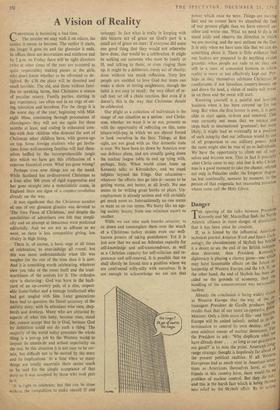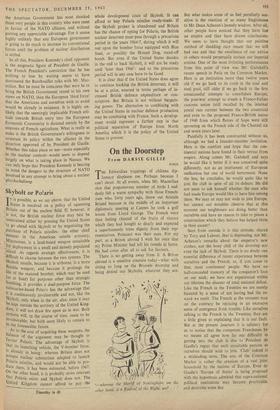Danger
Tnu opening of the talks between President Kennedy and Mr. Macmillan finds the North Atlantic alliance in more danger of dissolution that it has been since its creation.
If, as is hinted by the influential American technical journal Aviation Week and Space Tech- nology, the abandonment of Skybolt has behiqd it a desire to see the end of the British indePo” dent deterrent, then President KennedY's diplomacy is playing a clumsy game--one which may have lamentable effects on the future re- lationship of Western Europe and the US. if- on the other hand, the end of Skybolt has been de" cided on the grounds of economy, then the handling of the announcement was inexcusablY tactless. Already the conclusion is being widely Jr '"n in Western Europe that the way of the transigcnt President dc Gaulle produces heIle results than that of our more co-operative PPriie Minister. Only a little more of this—and Wester° Europe will be united indeed: united in its dci,. ; termination to control its own destiny, and,3` own minimal means of nuclear deterrence. "" the President to ask: 'Why duplicate what we have already done . . . so long as our guarantees are good?' is to miss the point. American long; range strategic thought is hopelessly far ahead 0" the present political realities. If all V*restern Europeans had as much trust in American inter'. lions as Americans themselves have, as their friends in this country have, there would be rlo problem of nuclear control. But they do "I; and this is the harsh fact which is being thrown into relief by the Skybolt affair. By its action
the American Government has most shocked those very people in this country who were most in favour of the NATO alliance, and without gaining any appreciable advantage. For it seems highly unlikely that any European government is going to do much to increase its conventional forces until the problem of nuclear distribution is settled.
In all this, President Kennedy's chief opponent is the enigmatic figure of President de Gaulle. The French President's conviction that he has nothing to lose by waiting seems to have dominated the Rambouillet talks with Mr. Mac- millan. But he must be conscious that were he to bring the British Government round to his own views on NATO, then the European 'third force' that the Americans and ourselves wish to avoid would be already in existence. It is highly un- likely that the seemingly implacable French atti- tude towards British entry into the European Economic Community is dictated merely by the interests of French agriculture. What is really at stake is the British Government's willingness to orientate its policy within the alliance in the direction approved of by President de Gaulle. Whether this takes place or not—more especially in the nuclear context—would seem to depend largely on what is taking place in Nassau. We can only hope that President Kennedy is bearing in mind the dangers to the structure of NATO involved in any attempt to bring about a nuclear gleichschaltung.





























 Previous page
Previous page